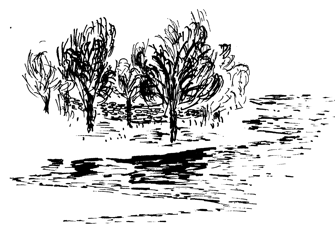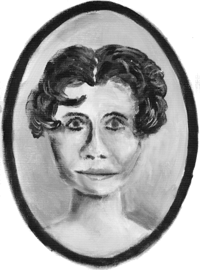

Home, Introduction, Chapter 5, Chapter 10
The Story So Far: According to legend, Bandicoot Valley was formed by the bandicoot Dhurwan, who was so greedy and grew so fat, that he forced the mountains apart. Many of the place names in Bandicoot Valley are derived from this, e.g. Durra Creek (from dhurra = thigh) and Narmi Falls (from nhami = jaw).

Zimbabwe
The first white man to set foot in South Bandicoot was Nobelius Augustus ("Nobby") Clark, an ex-Captain of the British army who had served with distinction in the Peninsular War, but was cashiered after disgracing himself at Waterloo when he fought on the wrong side, not realising that the unit to which he was attached had defected to Napoleon. At his Court Martial, he tried desperately to defend himself:
"I am a professional soldier," he said. "I have fought frogs and wops and krauts and boongs. I have fought with frogs and wops and krauts and boongs. I have fought in desert and I have fought in forest. I have fought in searing heat and I have fought in freezing snow. I have fought facing England. I have fought facing away from England. I obey orders. My last order was to join Marshal Ney and to obey his orders. What have I done wrong?"
After a series of futile attempts to rehabilitate himself, he decided to migrate to the colonies. A quick check on the whereabouts of members of his old regiment revealing that none were in Sydney, he embarked at Southampton on the Lady Denman on 31st March, 1827 with high hopes and a borrowed letter of introduction to Governor Bligh. After a frustrating two years in which his chicken farm at Mt Druitt near Sydney was washed away in floods, decimated by disease, wrecked by dissident members of the 13th Penrith Rifles and finally confiscated by the New South Wales Chicken Control Commission, he obtained a crown lease on fifty acres in the Southern Tablelands for the princely sum of 1s per year. Spending his remaining 13/4d on stock, he set out in late June, 1831. As his journal records, in the beginning there was nothing but disappointment:
It is a desert of trees. Nothing but trees. We scrambled for a day up a steep rise, hacking through scrub and creepers, the tops of the trees vanishing as pillars into the sky, fighting to keep the pigs together as they foraged on gum nuts as though they were acorns, and at the top we looked down into the next valley: an undulating wave of trees reaching to another crest, another valley, another wave of trees. Is there anything but forest? I keep on only for the sake of the pigs, but do they appreciate it, do they understand? Why should they? A gumnut is a gumnut is a gumnut, and any gumnut is the same as any other gumnut, until it has been eaten, when it ceases to be a gumnut and another gumnut must be found. Only acorns are better, but there are no acorns here, only gumnuts.
Clark’s maps were hopeless. His lease was a collection of lines on a blank piece of paper. At first, he tried to find it. Eventually he succumbed to the temptation of lesser men: find a spot that you like and grab it. His journal describes the discovery:
At last, we have come to Eden. A broad valley, grassland, with a river flowing through, and a line of trees. The pigs disagree. They wish to go back into the trees and find more gumnuts, but I am sure that there will be more gumnuts down by the river. So who shall be the winner, a claustrophobic man or a mob of agoraphobic pigs? Only time will tell.
He picks up the story again the next day:
The pigs and I have reached a compromise. Can one compromise with a pig? They think that they have won, but for all that, we are in the middle of the valley, in a copse of trees where a small creek joins the river. Upstream, about a mile or so, there is an aboriginal encampment. I can see the plumes of smoke from their cooking fires rising above the trees, and more strangely, some piled stones, almost as if there were a dry stone wall. Is it possible that some aboriginals have risen above rude lean-tos and a life of wandering? Could this be the Zimbabwe of the Southern Tablelands? I must find out tomorrow.

An Early Depiction of Bandicoot Valley,
attributed to Lee Wan Tu
The letters of Maria Tully, now in the Centre for Australian Studies at the University of Melbourne, Wisconsin, U.S.A., tell us a lot about the early days of South Bandicoot. Maria’s father, Sir Ingham Tully, was a model proprietor for his small estate at Sodding Parva in Dorset, specialising in the development of crops which were adaptable to the social ecology of the day, such as corn that stood up again when the fox hunt had passed and homing pheasants that escaped from poachers’ bags. Maria was the fifth child and only surviving daughter of Sir Ingham. Contemporary reports indicate that she was an ugly duckling as a child, all teeth and freckles. She had little formal schooling, although scoring a record "kill" for the time of seventeen governesses in three years, sixteen of them being
... carried away from Tully House in seas of tears which did not cease until they were finally laid to rest.
The full story of the music master has never been told. Consequently, Maria spent most of her time in the stables and on the farm with her brothers.

Maria Tully
At the age of sixteen she was suddenly declared the neighbourhood beauty, and received a constant stream of invitations to balls and parties. It is not clear how much this had to do with her father’s acknowledgedly handsome fortune (which was later dissipated on a peculiarly recalcitrant variety of spinach), and how much to genuine beauty. The only extant portrait, a miniature that forms part of the Tully Collection in the Greenland Museum of Technology, reveals little other than a conventional Victorian insipidity.
At twenty, Maria was still unmarried and was regarded as being "on the shelf". At least some of this stemmed from her own outrageous behaviour, such as riding astride and managing the farm single-handed during her father’s now extended absences in London, but it is clear that she also rejected one "very flattering" offer, a decision that was to cause her great misfortune.
On 13th December, 1828, Maria Tully was tried for the murder of Solomon Nash before Mr Justice Azrael at the Assizes at Sodding St Paul. The prosecution case was based on the findings of the Coroner, Mr Justin Saltmarsh, a second cousin and rejected suitor of Maria Tully. The coroner found that Miss Tully:
... did willingly go out upon the terrace with Mr Nash on a night of cold and wind and rain, with clear purpose that could not but fail to impress upon Mr Nash that the normal conventions of polite behaviour were to be treated with contempt, and that once there she did push him so hard on the wet pavement that he did not only smash open the rear of his skull upon a gargoyle but then fell to his death into the ha-ha, whereupon he broke his neck.
Maria’s defence was that the room was hot and that she had felt faint, and had requested Mr Nash’s escort since on previous meetings he had been "a prettily behaved young man" and she felt that she would be safe with him. Finding Mr Nash’s advances distasteful, she had pushed him gently away, but his foot had slipped on the wet flagstones, with fatal results. Eyes downcast, she regretted that the defence of her honour had brought such high toll, but challenged the court to require that any woman, placed in such a position, should behave any differently.
The jury, aware both of Miss Tully’s reputation and of the need to protect their womenfolk, compromised by finding her guilty of manslaughter. An obviously disappointed Justice Azrael, who had spent the luncheon adjournment being fitted for a new black cap, sentenced her to transportation for fourteen years.
On 28th February, 1830, Maria Tully was assigned as a domestic servant to Jenkins Metatron, a former Archbishop of Penang who had a crown lease of over a million acres covering parts of the Southern Tablelands and Snowy Mountains area that nobody had ever seen. Metatron was described by W.C. Wentworth as:
... a travesty of a man. His teeth are green and his hair is matted and purple. He thinks only of women and of the acquisition of money for the purchase of the same, but has powerful friends at home such as Lord Belphegor and Bishop Saktas, so the Governor must listen to him and pander to his whims. His broad acres are grazed by none but moths and wallabies whilst he turns the slums of Parramatta from cesspit to charnel house.
Maria Tully was delivered to Metatron’s house at 11 a.m. on that day. Two hours later, she had disappeared. Bloodstained garments, identified as hers, were found on the premises, and the finger of public opprobrium, pointed at Metatron, surged over him and nearly washed him away. There was no firm evidence, however, and no body, so Metatron never came to trial.
A recently discovered letter, written almost a year later by Maria to her next oldest brother, Gladstone, serving at the British Embassy in Moscow, does little to solve the mystery:
When this letter reaches you, it will prove the miracle of modern communication where there is supposedly none at all. It will never cease to entertain me the way in which a smile, a friendly dray driver and a few months’ dry weather will achieve, albeit with less apparent expedition, that which mail coaches and steam engines forever promise but consistently fail to deliver.
Your Maria has, of course, fallen on her feet in this vast land, although the feet cannot equal in size nor power those of our most distinguished native inhabitants who bounce across the plains as if with seven league boots...
In another letter, Maria describes the arrival of Nobby Clark:
Our little paradise, it seems, has finally been invaded by the white man. Meaning no insult, my dearest brother, but absence does not make the heart grow fonder, nor make the hirsute gender the more desirable.
It happened upon a totally miserable day last November, bleak and overcast and cold: almost like England! Ellen and I had finally completed the wall around the garden, to keep the wombats from the peas. It is dry stone, and heavy, because the wombats push very hard and had reduced the old brush fence to ribbons within a few nights. We had spent many days carrying the stones from the stream, even with the help of Xenophon, Artaxerxes and Darius, the three of our local aboriginies who are the most friendly. The name of the tribe sounds almost Welsh, but Xenophon, at least, is beginning to speak quite passable English, although his sentence construction and use of articles is still a little eccentric. Florence, our maid, is of course completely fluent, except where strange engines such as our new mangle leave her totally speechless.
Artaxerxes and Xenophon came up the front path and rapped on the door. Ellen was going to send them away, because they have strict instructions that if they wish to see Florence then they should call at the Tradesmen’s Entrance (which otherwise would be little used owing the the scarcity of delivery services in this region), but it was obvious to me that they were labouring under some serious concern, so I came to the door and asked them what was the matter.
"White man come, Missus Tully," Xenophon said. "Up alonga hill, with big mob dogs go ‘grunt, oink’. Him belonga you?"
I shook my head. "He is not mine."
"You want we stick him?" Xenophon asked.
Ellen was nodding so fast that I thought that her head would fall off, but I held up my hand to restrain her.
"No, Xenophon," I said. "We do not do that sort of thing here." I could have added "not unless he has green teeth and purple hair", but I could not see that we were in any risk of that person’s presence.
Maria Tully’s first impressions of Clark were not favourable:
He is stupid, that no person will deny. He comes over the hill, when there is a perfectly good track down the valley, and he settles where Muddy Creek joins the river and so will be neck deep in water the next time that it rains. His upper lip is so stiff that his moustache misses his mutton chops by at least two inches.
Later on, her opinion becomes more charitable:
He is, of course, utterly stupid, but then what man is not? Underneath that stupidity there is, however, a kindness that encompasses more than his pigs, and his gumnut bacon has a delicacy that pleases the most critical of tastes.

Xenophon, with the stubby didgeridoo so
characteristic of the local aboriginal tribe.
In her last extant letter, which was in fact written after the death of her brother, who was devoured by wolves while attempting to cross the Volga on 13th September, 1832 (an incident which nearly led to war between Britain and Russia), there is a foretaste of the tragedies to come:
Xenophon is dead. Captain Clark thinks that it is swine fever, because his pigs have runny noses too, and is blaming himself for bringing it upon us, but I cannot agree with him, because Xenophon was no swine but a nice man; a much nicer man than many with far lighter skins. Darius and Cyrus are also sick, and Florence is looking peaky. They are fatalistic about death. "It comes to us all", Xenophon told me. I hope that it does not come to them all, because they are good neighbours, and useful to have around.
Copyright © D.W. Walker, 1991